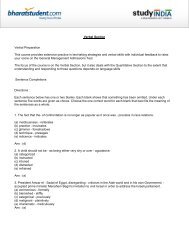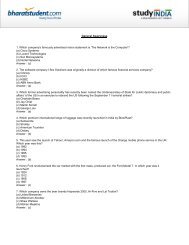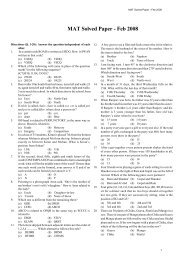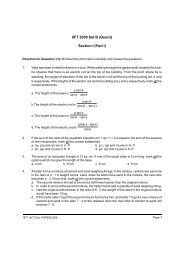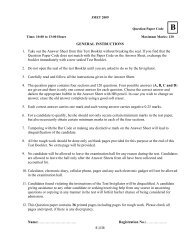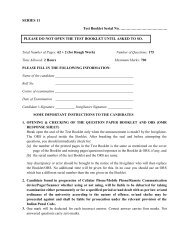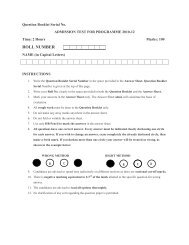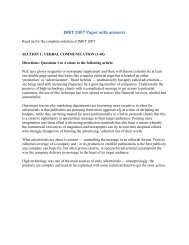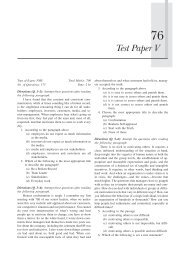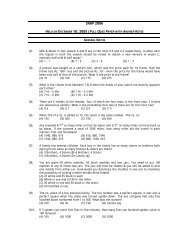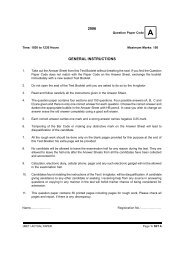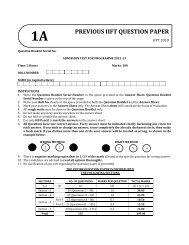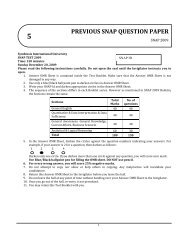PREVIOUS FMS QUESTION PAPER
PREVIOUS FMS QUESTION PAPER
PREVIOUS FMS QUESTION PAPER
You also want an ePaper? Increase the reach of your titles
YUMPU automatically turns print PDFs into web optimized ePapers that Google loves.
search engine (and Search engines in general) such<br />
huge flatteners. Never before in the history of the<br />
planet have so many people – on their own – had the<br />
ability to find so much information about so many<br />
things and about so many other people.<br />
Said Russian-born Google cofounder Sergey Brin, “If<br />
someone has broadband, dial-up, or access to an<br />
Internet cafe, whether a kid in Cambodia, the university<br />
professor, or me who runs this search engine, all have<br />
the same basic access to overall research information<br />
that anyone has. It is a total equalizer. This is very<br />
different than how I grew up. My best access was some<br />
library, and it did not have all that much stuff, and you<br />
either had to hope for a miracle or search for<br />
something very simple or something very recent. When<br />
Google came along, he added, suddenly that kid had<br />
“universal access” to the information in libraries all<br />
over the world.<br />
That is certainly Google’s goal – to make easily<br />
available all the world’s knowledge in every language.<br />
And Google hopes that in time, with a PalmPilot or a<br />
cell phone, everyone everywhere will be able to carry<br />
around access to all the world’s knowledge in their<br />
pockets. “Everything” and “everyone” are keywords<br />
that you hear around Google all the time. Indeed, the<br />
official Google history carried on its home page notes<br />
that the name “Google” is a play on the word “googol”;<br />
which is the number represented by the numeral 1<br />
followed by 100 zeros. Google’s use of the term reflects<br />
the company’s mission to organize the immense,<br />
seemingly infinite amount of information available on<br />
the Web, ‘just for you”. What Google’s success reflects is<br />
how much people are interested in having just that – all<br />
the world’s knowledge at their fingertips. There is no<br />
bigger flattener than the idea of making all the world’s<br />
knowledge, or even just a big chunk of it, available to<br />
anyone and everyone, anytime, anywhere.<br />
“We do discriminate only to the degree that if you can’t<br />
use a computer or don’t have access to one, you can’t<br />
use Google, but other than that, if you can type, you can<br />
use Google,” said Google CEO Eric Schmidt. And surely<br />
if the flattening of the world means anything, he added,<br />
it means that “there is no discrimination in accessing<br />
knowledge. Google is now searchable in one hundred<br />
languages, and every time we find another we increase<br />
PP-02 2A.8<br />
<strong>FMS</strong> Dec 2010<br />
it. Let’s imagine a group with a Google iPod one day and<br />
you can tell it to search by voice – that would take care<br />
of people who can’t use a computer- and then [Google<br />
access] just becomes about the rate at which we can get<br />
cheap devices in to people’s hands”.<br />
How does searching fit into the concept of<br />
collaboration? I call it “informing.” Informing is the<br />
individual’s personal analogue to uploading,<br />
outsourcing, in sourcing, supply chaining, and offshoring.<br />
Informing is the ability to build and deploy<br />
your own personal supply chain – a supply chain of<br />
information, knowledge, and entertainment. Informing<br />
is about self-collaboration – becoming your own selfdirected<br />
and self-empowered researcher, editor, and<br />
selector of entertainment, without having to go to the<br />
library or the movie theatre or through network<br />
television. Informing is searching for knowledge. It is<br />
about seeking like-minded people and communities.<br />
Google’s phenomenal global popularity, which has<br />
spurred Yahoo! and Microsoft (through its MSN Search)<br />
also to make power searching and informing<br />
prominent features of their Web sites, shows how<br />
hungry people are for this form of collaboration. Google<br />
is now processing roughly one billion searches per day,<br />
up from 150 million just three years ago.<br />
The easier and more accurate searching becomes,<br />
added Larry Page, Google’s other cofounder, the more<br />
global Google’s user base becomes, and the more<br />
powerful a flattener it becomes. Every day more and<br />
more people are able to inform themselves in their own<br />
language. Today, said Page “only a third of our searches<br />
are U.S.-based, and less than half are in English.”<br />
Moreover, he added, “as people are searching for more<br />
obscure things, people are publishing more obscure<br />
things,” which drives the flattening effect of informing<br />
even more. All the major search engines have also<br />
recently added the capability for users to search not<br />
only the Web for information but also their own<br />
computer’s hard drive for words or data or e-mail they<br />
know is in there somewhere but have forgotten where.<br />
When you can search your own memory more<br />
efficiently, that is really informing. In late 2004, Google<br />
announced plans to scan the entire contents of both the<br />
University of Michigan and Stanford University



